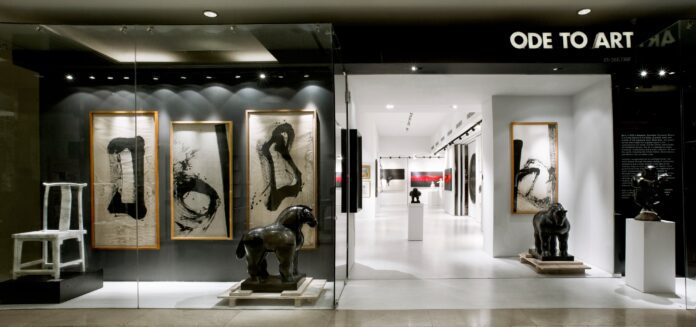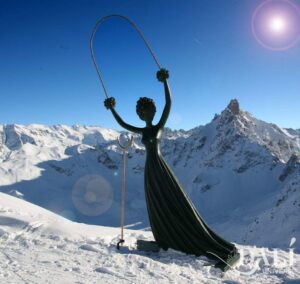
Artist: Bahk Seonghi
Known for his ethereal installations that appear to float in space, Bahk’s works examine culture, space and time. Charcoal, his material of choice, is fundamental in this exploration- its colour resembles the Asian ink wash.
Following his graduation from Chung-Ang University in Seoul, the artist spent several years in Europe, studying sculpture at the Accademia di Belle Arti Brera in Milan and Barnet College in London. The influences of the new perspectives he gained in the West can be seen throughout his works.

His monumental hanging installations have gained international recognition, with many exhibitions to his name.
Patrick Rubinstein
French artist Patrick Rubinstein ties the past and present themes and is inspired by Optical Art and Kinetic Art. This innovative technique allows visual variations when the spectator moves around the work playing with our perceptions through art.
Eva Armisen
The Spanish artist, nicknamed “the painter of happiness”, celebrates seemingly mundane moments in her faux-naïve art, reminding us to cherish our loved ones and to appreciate every moment spent together.

Armisen celebrates seemingly mundane moments in her faux-naïve art, reminding us to cherish our loved ones and never forget our inner child.
Paul Rousso
Through his concept called “Flat Depth”, the American artist blurs the line between 2D and 3D and transforms our perception of disposable, single-use paper into cultural practices and precious memories to be treasured and conserved before the digital age replaces it all.

Salvador Dali
Known worldwide as one of the most eccentric visual artists, Salvador Dalí’s attraction to the quirky masterpiece by Lewis Carroll did not come as a surprise, and his 1969 illustrations of the book were so dear to the artist he made them into sculptures.

Ran Hwang
Ran Hwang is a Korean-born artist. She is best known for creating intricate, large-scale wall installations with exquisite materials from the fashion industry, such as beads, buttons, pins and thread. She is an abstract artist with visuals of spiritual discipline and free-flow moments of human nature.

Chansrinual
Amidst the consistency of textural nuances is a sense of therapeutic serenity that persists throughout the painting. Chansrinual presents a mesmerizing view of nature, its waterfalls, the skies, and the mountains imbued with life and irreplicable vitality.

This scenery of beauty invites lures and transports the viewer into the work itself; the artist’s painting perspective is transposed and blurred into the audience’s viewing angle and position.
Annalù
Annalu creates a porous yet cohesive textural surface by meticulously arranging intricate materials, effectuating a series of contrary visual effects that interact with one another transparency and opacity, disintegration and construction. All of these allude to the blurring of supposed binary oppositions, ephemerality and preservation that involves dilating one’s perception of time.

Byun DaeYong
The South Korean artist has a universe full of humour and pop elements. In this sculpture, a polar bear balances her baby while looking at her child with love and affection.

Through his playful imagery, he explores family and the importance of sharing and passing on values to future generations. Moreover, with the pink ice cream, he alerts the youngest generations about global warming and the environmental impact of modernization that polar bears face in cooler climates.
Yu Nancheng
Work aims to reinterpret China’s rich cultural legacy. In this series, he paints crowds of people engaged in the practice of tai chi against the backdrops of Tiananmen Square, significant in Chinese society and history. The mass of practitioners moving in unison makes the painting impressive and emphasizes that a shared sense of heritage unites them.

Yu Nancheng uses a palette knife for sculpting texture in his oil on canvases. The canvas moves out of extreme simplicity into a crisscross of wheeling, rolling figures.
Lee Sangsoo
Fascinated with innovation and new technologies, Lee Sang Soo questions our relation to nature in a hyperconnected world.

His works appear extremely dynamic, an impression he achieves through an intricate use of positive and negative space in three dimensions. His animals, minimal in form but extremely lively in colour, are represented only through clean, twisting lines. Through a subjective perspective, Lee Sangsoo grasps and captures deceptively simple morphological traits, making his figures immediately recognizable.
Cats, dogs, horses, roosters, and flamingos dialogue with the surrounding space and create evocative, elegant, dynamic, and colouristic effects.
